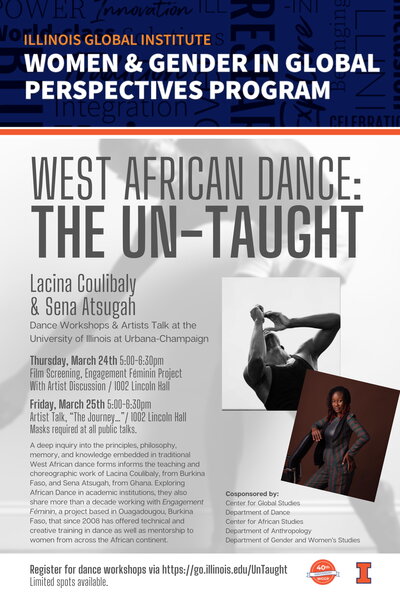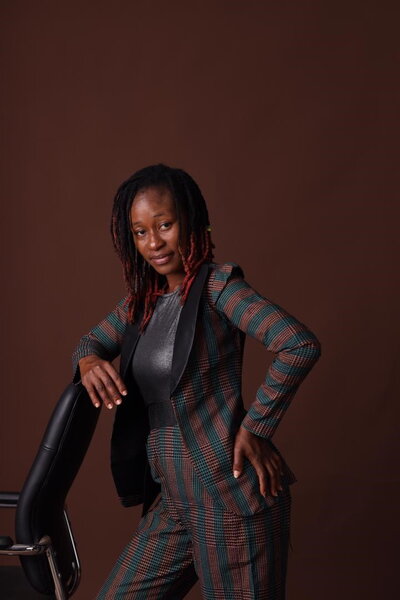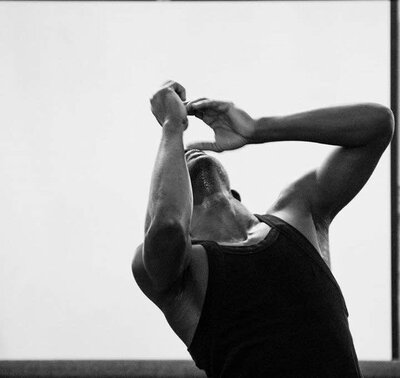
A deep inquiry into the principles, philosophy, memory, and knowledge embedded in traditional West African dance forms informs the teaching and choreographic work of Lacina Coulibaly, from Burkina Faso, and Sena Atsugah, from Ghana. Both artists are concerned with the value and consideration accorded to African Dance in academic institutions, given their extensive experience teaching dance in West African, North American, and European universities. They also share more than a decade working with Engagement Féminin, a project based in Ouagadougou, Burkina Faso, that since 2008 has offered technical and creative training in dance as well as mentorship to women from across the African continent.
In their two-day visit to the UIUC campus, Sena and Lacina will teach two dance workshops, present a recent documentary film about Engagement Féminin, and discuss their own creative work and research as artists.
These events are hosted by the Women and Gender in Global Perspective program with co-sponsorship by the Center for Global Studies, Department of Dance, Center for African Studies, Department of Anthropology, and the Department of Gender and Women's Studies.

Thursday, March 24th 5:00-6:30pm
1002 Lincoln Hall
Film Screening, Engagement Féminin Project, based in Ouagadougou, Burkina Faso, that since 2008 has offered technical and creative training in dance as well as mentorship to women from across the African continent.
Friday, March 25th, 5:00-6:30pm
1002 Lincoln Hall
Artist Talk, "The Journey...." will feature both Sena Atsugah and Lacina Coulibaly talking about their work
There are a few remaining spots for two dance workshops that are open to the broader campus and community. Please see below for more information. You must pre-register and receive confirmation for acceptance into these dance classes. No prior experience required.
REGISTRATION REQUIRED at https://forms.illinois.edu/sec/1571872904
For specific questions and remaining spots, please contact Anita Kaiser at arkaiser@illinois.edu or (217) 333-6221
Both movement classes will be jointly taught by Lacina Coulibaly and Sena Atsugah, offering an entry into their theoretical and methodological approaches to dance teaching and creation. The lead teacher for each class is indicated with the workshop descriptions.
Workshop 1: Thursday, March 24th 1:00-2:50pm
Workshop Description (Lacina Coulibaly): This workshop focuses on my ongoing research (Sigini) based on the fundamental principles of dance in Subsaharan Africa. Sigini is a semantic and pedagogical approach that establishes three principles of conceiving, writing, and sculpting the art of making dance.
Sigi, the incarnation principle.
Sigi meaning to sit is the foundation and the kinesthetic form of the dance. It allows us to be centered in ourselves and to be engaged in our kinesthetic space. Sigi is based on the geometrical structure of the body. The particularity of Sigi is to highlight the suspended impulse, an up-holding stance, a sustaining of the body which gives rise to its effortless use and its particularity is to reveal the aesthetic of the dance.
Taama, the relational principle.
Taama meaning to walk is the principle that privileges extension, relationship, the connection with oneself, one’s space, or with any other agent existing in the space or in the imaginary. Taama is based on the logic of the body, the mechanism causing simultaneously dissociation, opposition, and complementarity of the limbs of the body which allows us to establish fluidity, articulation of the body. Its particularity is to give life to the space.
Folisén, the organizational principle.
Folisén meaning rhythm is the universal organizer that allows us to maintain, deepen and innovate our relationship and engagement in and with space. It is a phenomenon that permits us to move from uncertainty to rightness.
It is the rhythmic structure that organizes, defines, and rules of the dance; it is the essence itself of the technique of dance in Africa. Its particularity is to reveal the beauty of the dance and to open the door that transcends to a deep consciousness where one becomes an eye, an ear, a consciousness that realizes itself.
The particularity of dance in sub-Saharan Africa is that the dance itself is an exploration of movement performed in repetition. A process of deepening the movement to go to the essential. Perfection is not a very sought-after objective but the correctness of the execution of the movement. It is the very essence of dance.
Workshop 2: Friday, March 25th 9:00-10:30am
Workshop description (Sena Atsugah): The body is a vessel, and the primary source of material to inform certain stories, and I am driven to speak about these stories through the body, thus dance. As a choreographer, a performer, and a teacher, I use the experiences and techniques that are most connected to the topics I wish to explore and the agendas I wish to shed light on. Coming from a lineage of Traditional Ghanaian dancers and singers, my style has been rooted in tradition and culture whiles finding perspectives in the contemporary. My current interest into ritual dances and spirituality makes me rely on “cultural memory” as my approach to movement expression and transmission. I will be interested to share some principles and aesthetics that are embedded in some of these dance forms. These will include but are not limited to the principles of circles, undulations, and vibrations as tools of power, connection, and self- consciousness. My movement is not necessarily about showing beauty, as it is about communicating honesty. I seek freedom in my work, as I create movement vocabulary that builds the energy, pace, and emotional needs of contemporary trends.

Sena Atsugah is currently an Assistant lecturer with the Department of Dance Studies, University of Ghana on study leave and Fulbright Foreign Student (PhD) at Temple University in Philadelphia. Sena Atsugah is an enthusiastic choreographer, teacher, and a performer. She obtained a Bachelor of Fine Arts and a Master of Fine Arts Degrees from the University of Ghana in 2008 and 2016 respectively. Over the years, she has been engaged in numerous dance productions, performances and Workshops with students, researchers and lecturers from the University of Ghana, and foreign universities. In gaining more insight into contemporary African dance, she took part in the maiden edition of a dance workshop dubbed Engagement Feminine in 2009 through to 2016 in Burkina-Faso. Through this project, she had the opportunity of touring and performing in Bordeaux in France and Yale University in the United States. She participated in the March an annual dance workshop in Ecole de sable in Senegal and had the opportunity to be selected by Kabawil to be part of Framewalk, an intercultural student exchange program held in Ghana and Germany. She is also the founder and artistic director of Ti-fali Organisation, a performing arts NGO in Accra, Ghana.

Lacina Coulibaly was born in Burkina Faso. His professional dance career, deeply rooted in African traditional dances, later merged with European contemporary influences to create a uniquely African choreographic expression. In 1995, Lacina created the award-winning Cie Kongo Bâ Teria with Souleymane Badolo and Ousseni Sako, which toured extensively in Europe and the U.S. He has also danced and choreographed with several international dance companies (Salia ni Seydou, Faso Danse Theatre, TchéTché, Urban Bush Women), and collaborated artistically with such artists as Emily Coates, Amy Sullivan, Wendy Jehlen, Kota Yamakazi, and Seydou Coulibaly. He also served as Associate Choreographer to the project Engagement Feminin (a training program designed to encourage female dances in Africa), initiated by the August-Bienvenue Cie, and he is currently Artistic Director of Compagnie Artistique Hakili Sigi. As an experienced educator and teacher, Lacina has taught at numerous universities and is currently a lecturer faculty at Yale University and Sarah Lawrence College.